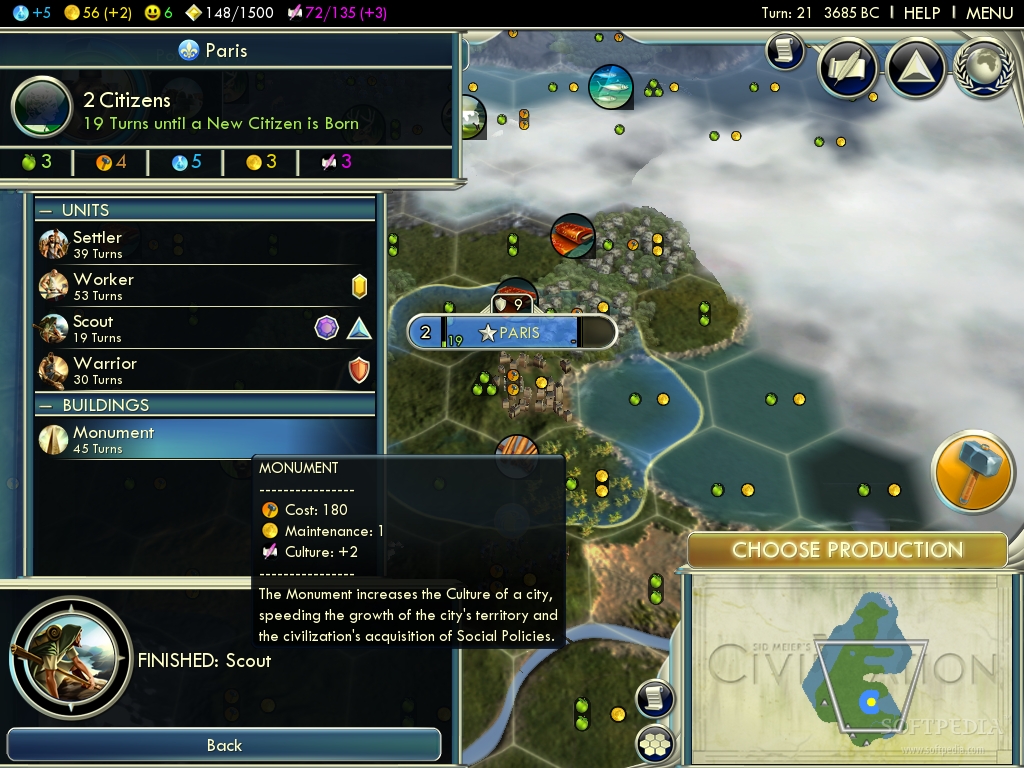

Firaxis has already announced the first patch for the game will attempt to address some of these issues, as well as errors involving crashed games and corrupted saves. I haven’t played enough to think this design is a game-killing flaw, but I’ve definitely seen a few head-scratching moves. In the lone mixed review I’ve seen of the game, 1UP.com’s Tom Chick says that the longer you play, the more likely you are to become disheartened with stupid combat AI that frequently leaves key units unprotected or executes strategies that are just plain dumb. The new combat system feels like a much-needed shakeup, but it’s a shame that it feels like your computer-controlled opponents haven’t mastered the rules of engagement. Part of building a good defense is recognizing and controlling chokepoints on the map, or catching enemy units off-guard with archers and cannons that can fire over distances. This means that, for the first time, combat comes out of the game’s cities and into the surrounding terrain. Whereas past “Civ” games allowed you to stack dozens of units on top of one another and made every conquest a war of attrition, “Civ V” allows only one military unit per hex on the map. Once you go to war, you’ll experience “Civ V’s” vastly superior combat system. The artificial intelligence in "Civilization V" occasionally leaves computer-controlled units vulnerable to ranged attacks. Because city-states just consist of one settlement and a few military units, an aggressive, militaristic civilization can take one out pretty quickly, so you’ll need to be fairly watchful of your allies. You’ll often be expected to pledge to keep your little buddies safe from other civilizations who try to bully them. But friendship does not come without costs. The more sway you have with a city state, the more benefits you’ll reap, from resources to the occasional gift of a military unit. Incapable of founding second cities, these entities are meant to be a key driving force in shaping “Civilization V’s” narratives.Įach city state has its own influence meter.

One of the first things you’ll notice are city states, isolated one-city governments throughout the world that aren’t competing to win the game. Though “Civ V” will feel familiar to longtime fans of the series, it sports a number of refinements and new features that weren’t found in 2005’s “Civilization IV.” There are several ways to win, ranging from conquering the whole world to colonizing another planet or currying enough diplomatic favor to take charge of the United Nations. You’ll use that settler to found a city and from there create a military, expand your borders and research technologies, beginning with simple inventions like “animal husbandry” and extending all the way out to “nanotechnology.”Īlong the way, you’ll run into other civilizations that you can conquer or collaborate with. Since my college roommate introduced me to the first “Civ” in the early 1990s, I’ve easily spent more time on the “Civ” games than on any other gaming franchise.Īs in past “Civilization” games, “Civ V” (rated E10+, $50 on PC, requires online activation) puts you in charge of one settler and one primitive warrior.
CIVILIZATION V REVIEW SERIES
Its lessons in history and geopolitics, conditions for nonmilitary victories and ridiculous customizability give the series more replay value than anything else out there. ‘‘Sid Meier’s Civilization” has always been gaming’s greatest strategy franchise. An overhaul to warfare in "Civilization V" takes conflict out of the cities and into the surrounding countryside.


 0 kommentar(er)
0 kommentar(er)
